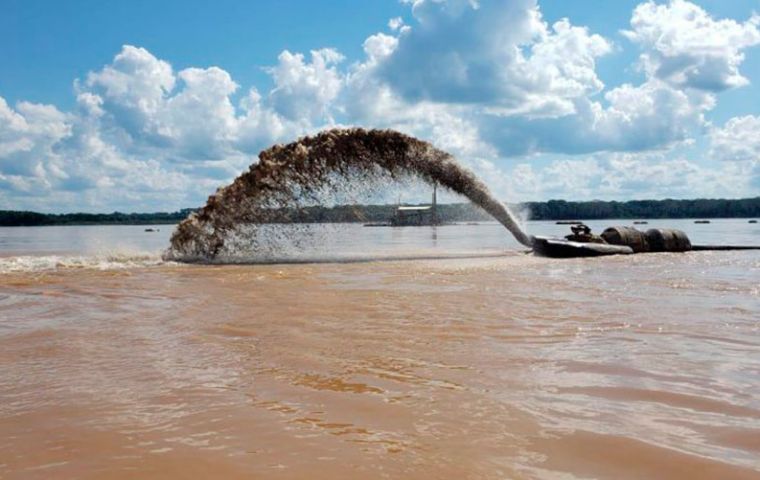MercoPress. South Atlantic News Agency
Brazil to begin dredging stretches of the Amazon fluvial network because of the drought
 Due to the dry season, ships cannot operate at full capacity in the Amazonian ports, especially in Itacoatiara and Manaus.
Due to the dry season, ships cannot operate at full capacity in the Amazonian ports, especially in Itacoatiara and Manaus. Several Brazilian ministries have joined efforts in a desperate attempt to impede the gigantic Amazon basin and its fluvial network from continuing to lose water, result of a scorching drought and insufficient rainfall.
Faced with this situation which is expected to worsen before it begins to improve the ministries of Transport, Ports and Airports will be investing millions to dredge the Madeira and Solimoes, crucial waterways for transporting goods and products in the Amazon region, including the Manaus Free Trade Zone and for transporting people.
Dredging a river entails removing sediments and settled residues that reduce its depth and make it less navigable. By dredging a river or other bodies of water, the depth is increased, facilitating vessel traffic.
Ministers Renan Filho (Transportation) and Silvio Costa Filho (Ports and Airports), signed a work order authorizing the dredging of a stretch of the Solimões River between Tabatinga and Benjamin Constant, in the far west of Amazonas.
According to the government, the aim is to combat the risk of local population shortages and reduce the economic impacts of the drought in the states of Amazonas and Rondônia. “It is not the entire river that has silted up, obstructing navigation. We have critical shallow points that must be addressed for vessels to pass and the flow of production and supplies to continue,” stated Renan Filho.
The works are scheduled to commence this week and are expected to last for 45 days.
A second work order will be signed authorizing the dredging of two critical navigation points in the Madeira River, at the Tabocal region near the capital Manaus, and at the river’s mouth in Itacoatiara. Here also the federal government has allocated millions of Reais.
The announced measures are a reply to the exorbitant fee charged which are impacting navigation and the export of products in the Amazon region, posing risks of shortages, particularly in the case of fuel and food destined for Manaus, capital of the Amazon.. During the dry season, pilotage companies began imposing a “Drought Fee,” with costs reaching up to the equivalent of tens of thousands of US dollars, according to the Amazon-based Federation of Industries of the State of Amazonas (Fieam).
Pilotage is a port service typically available for large vessels to ensure safe and unobstructed navigation. In the Amazon, specifically in the Madeira River region, particularly in Itacoatiara, large ports have operations focused on grain, container transport, and fuels destined for Manaus.
Although the state regulates pilotage companies, their fee practices are not monitored. According to Fieam President Antonio Silva, this lack of oversight allows actors in the sector to take advantage of the situation, imposing excessive charges. “Ship navigation is already being impacted by the so-called ‘drought fee,’ which is increasing logistics costs,” he points out.
According to trade expert Mário Pierre Filho, the increase in the fee started in August, during the drought season, a time when the Amazon economy already suffers due to the rivers’ reduced water levels. In previous years, pilotage company fees were around R$ 70,000, some US$ 15,000.




Top Comments
Disclaimer & comment rulesCommenting for this story is now closed.
If you have a Facebook account, become a fan and comment on our Facebook Page!